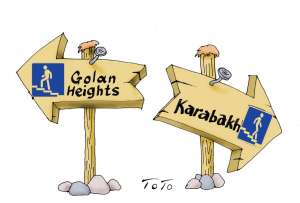 Any new development on the world scene is perceived and interpreted by each country from its own perspective which does not necessarily conform to the context and reality of the issue in question.
Any new development on the world scene is perceived and interpreted by each country from its own perspective which does not necessarily conform to the context and reality of the issue in question.
When the Yugoslav Federation was bombed and dismantled, giving birth to a new nation in the heart of Europe next to Albania, namely Kosovo, hopes were raised in Armenia that Kosovo could serve as a precedent for the recognition of Nagorno Karabakh’s independence.
This kind of logic ignores the fact that legality at best is a fig leaf to cover realities created by a powerplay. Major powers to suit their interests, create facts on the ground and later on develop legal parameters to justify a fait accompli.
When Armenians were heartened by the Kosovo precedent, they were told each case is dissimilar, having its own legal premises, even though that justification defied logic.
Today, a new reality has emerged. We live in the Trump world which has become very colorful and shaken daily by new surprises. President Trump has offered a new gift to Israel, by a new proclamation where the US recognizes Israel sovereignty over the Golan Heights.
The Golan Heights is a historic Syrian territory, occupied by Israel during the Six Day War in 1967. It has water resources for agriculture but above all, it has a high strategic value for both parties. During that war, the fiercest battles took place on the Golan Heights where Israel suffered the highest casualties. But the Israeli leaders believe the sacrifices were justified by the value of the conquered territory. Israel had already annexed the Golan Heights to its own territory, disregarding the outcry in the Middle East. President Trump’s proclamation only offers the US’s endorsement of the Israeli action.
This deal is motivated by domestic politics in Israel and the US. Both leaders, Benjamin Netanyahu and President Trump, have been living in the shadow of legal and ethical indictments.
Netanyahu faces legal challenges for corruption charges which could endanger his prospects in the forthcoming elections. Trump, in his turn, was under the long shadow cast by the probe headed by Special Counsel Robert Mueller, which had fueled impeachment prospects in the Democratic ranks.
Although the Mueller report, according to US Attorney General William Barr did not find collusion in Trump’s case, it also failed to exonerate him. That was a partial victory for the president who faces tough reelection prospects in his own country. Therefore, the Golan Heights gift to Israel was a political raft for both leaders. The action will further energize Trump’s Evangelical base and further improve his relations with conservative Jewish voters.
Although the initiative was taken based on domestic concerns, it had huge international reverberations, about which Mr. Trump does not give a hoot.
The angry reaction of the beleaguered Syrian government was anticipated. In addition, the United Nations authorities also reacted. UN Secretary General António Guterres said it is “clear that the status of Golan has not changed.”
“The UN’s policy in Golan in reflects in the relevant resolutions of the Security Council and that policy has not changed,” added Stephane Dujarric, the UN Spokesman.
Golan is the second amputation of Syrian territory. The first one took place in the era of decolonization, when French occupying forces were leaving the Middle East. In 1939, the Sanjak of Alexandretta became the autonomous state of Hatay, carved out of Syrian territory but later that year it was ceded to Turkey.
The Syrian government had never recognized the loss. It always considered Hatay within Syria, in all official maps and school textbooks. But during the initial honeymoon between Syria and Turkey, the Agreement of Adana was signed in 1998, mostly to deter Kurdish incursions from Syrian territory into Turkey, but Damascus tacitly acquiesced to the fact that Hatay’s destiny was doomed.
President Trump’s proclamation has created also a serious political debate in Armenia. Once again, the Kosovo logic is being resurrected to see whether the Golan precedent and logic can be used to advance Armenia’s position or the fate of Karabakh. Not only there is excitement in the news media, but even official quarters have reacted to it.
The chief of staff of the Karabakh president, David Babayan, stated: “Trump openly stated that Golan Heights should belong to Israel. … We have also a similar situation here. That is the fate of Karvajar, where our water resources are located. If today we fail in our insistence that Karvajar will remain within the borders of the Armenian state, we will be blamed for a lack of political will in the future.”
Other pundits dwell on Armenian-US relations. Indeed, President Trump’s decision is the reflection of the close US-Israeli relations which Armenia does not enjoy. A prominent political analyst said he believes that “On a broader scale, whatever Trump is proposing for the Golan Heights Obama was proposing in the case of Karabakh, using the Russian and Azerbaijani political failures in the aftermath of the April war.”
Another commentator writing under the pen name of Aram Amaduni (most probably a member of parliament) was using the occasion to promote a pro-US policy for Armenia. Basing his argument again on the US-Israeli relations, he proposes that Armenia become an anti-Russian tool in the Caucasus to enjoy US confidence, and of course, qualify for its largess.
All this analysis and excitement may serve as a healthy political exercise, but analogies may not and will not help resolve the Karabakh conflict. It takes Armenia’s political wisdom to garner international support, backed by Armenian resolve to defend Karabakh by force, if necessary. Edmond Y. Azadian















